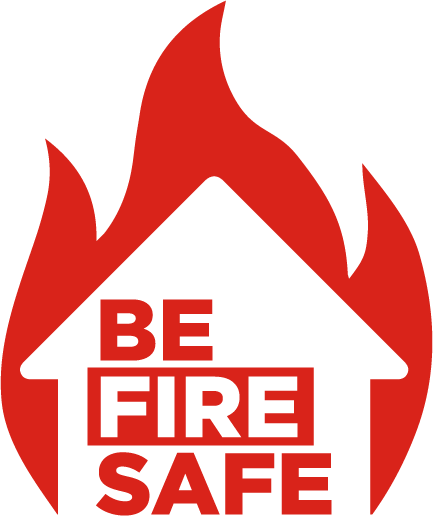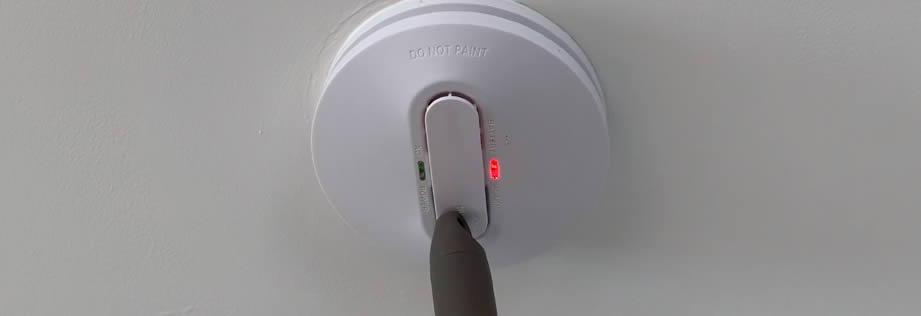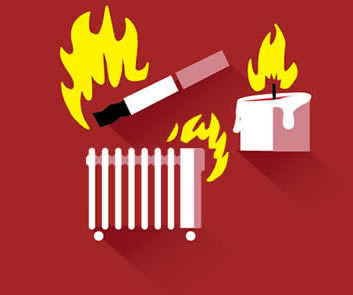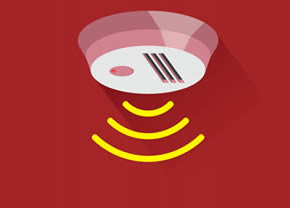- Home
- Fire safety
- Home fire safety
- Be Fire Safe this Winter

Be Fire Safe this Winter
Be fire safe by taking action to ensure you and your family stay safe over winter. Every winter, there are more than 1100 home fires, from which around 100 fire-related injuries occur.
Are you fire safe for winter? Our Winter Fire Safety Checklist will help prepare you, your family, and your home to be fire safe this winter.
Download your winter fire safety checklist and be fire safe for winter.
You can also watch our firefighters as they walk you through a winter fire safety check of a home.
Be fire safe by checking:
Did you know that you will not smell smoke while asleep? Only working smoke alarms save lives.
- Test that your smoke alarm/s are working. If not, change the batteries or replace the alarm.
- Check the smoke alarm is in date. Smoke alarms have a lifespan of ten years.
- Give the smoke alarm a vacuum, if you haven't done so in the last six months, to remove dust and any insects.
To meet legislation you must have at least one working smoke alarm on each level of the home placed between bedrooms and living areas, it's the law. FRNSW also recommends having one in each bedroom. Hardwired and interconnected is best.
Find out more about buying, installing and maintaining your smoke alarm

Did you know that you will not smell smoke while asleep? Only working smoke alarms save lives.
- Test that your smoke alarm/s are working. If not, change the batteries or replace the alarm.
- Check the smoke alarm is in date. Smoke alarms have a lifespan of ten years.
- Give the smoke alarm a vacuum, if you haven't done so in the last six months, to remove dust and any insects.
To meet legislation you must have at least one working smoke alarm on each level of the home placed between bedrooms and living areas, it's the law. FRNSW also recommends having one in each bedroom. Hardwired and interconnected is best.
Be Fire Safe with a plan of escape. Having a home escape plan in conjunction with a working smoke alarm will greatly increase your chances of getting out safely. Every second counts.
If there is a fire in your home, do not wait, EVERY SECOND COUNTS, GET OUT and STAY OUT and then call Triple Zero (000). Never go back inside a burning building.
Remember to consider the special needs of children, the elderly or the disabled when developing your escape plan.
- Draw your escape plan, and discuss it with your whole family. Download your grid here (PDF).
- Know and record two safe ways out of every room. Make sure that your windows and doors are not obstructed and can be unlocked and opened quickly if necessary.
- Practise your escape plan regularly with the whole household including pets. Your letter box is a great place to wait for firefighters arrival.
- As you escape make sure you close internal doors behind you. This can reduce fire spread and minimise damage.

Be Fire Safe with a plan of escape. Having a home escape plan in conjunction with a working smoke alarm will greatly increase your chances of getting out safely. Every second counts.
If there is a fire in your home, do not wait, EVERY SECOND COUNTS, GET OUT and STAY OUT and then call Triple Zero (000). Never go back inside a burning building.
Remember to consider the special needs of children, the elderly or the disabled when developing your escape plan.
- Draw your escape plan, and discuss it with your whole family. Download your grid here (PDF).
- Know and record two safe ways out of every room. Make sure that your windows and doors are not obstructed and can be unlocked and opened quickly if necessary.
- Practise your escape plan regularly with the whole household including pets. Your letter box is a great place to wait for firefighters arrival.
- As you escape make sure you close internal doors behind you. This can reduce fire spread and minimise damage.
The leading cause of home fires in NSW is leaving cooking unattended. Never leave cooking unattended. Stay in the kitchen while cooking and turn off the stove before you leave.
- Avoid cooking under the influence of alcohol or drugs.
- There are many dangerous substances in the kitchen. Flammable materials such as aerosols, cleaning agents and cooking oils should be stored away from heat.
- Keep loose clothing, fabrics, tea towels, curtains and flammable items away from the stove.
- Turn pot handles inwards. Pot handles hanging over the edge of the stove can be easily knocked or grabbed by children.
- Keep your oven, rangehood and grill clean and in good working order. A build-up of grease and fat can ignite in a fire.
- Keep matches and lighters out of reaches of children.

The leading cause of home fires in NSW is leaving cooking unattended. Never leave cooking unattended. Stay in the kitchen while cooking and turn off the stove before you leave.
- Avoid cooking under the influence of alcohol or drugs.
- There are many dangerous substances in the kitchen. Flammable materials such as aerosols, cleaning agents and cooking oils should be stored away from heat.
- Keep loose clothing, fabrics, tea towels, curtains and flammable items away from the stove.
- Turn pot handles inwards. Pot handles hanging over the edge of the stove can be easily knocked or grabbed by children.
- Keep your oven, rangehood and grill clean and in good working order. A build-up of grease and fat can ignite in a fire.
- Keep matches and lighters out of reaches of children.
Don't ignore the signs! A damaged or failing Lithium-ion battery can explode, releasing highly toxic fumes. These fires are hard to put out. Never use or charge a damaged battery.
- Do not charge batteries when sleeping or not at home.
- Once the device has a full battery, disconnect it from the charger.
- Make sure a smoke alarm or heat alarm is working in rooms where batteries are charged or stored.
- Charge batteries on hard surfaces that can't catch on fire like concrete floors or tiles. Don't charge them on surfaces like beds, sofas, or carpet.
- Large batteries like the ones used in e-scooters, e-bikes, and power-tools, should only be charged in the garage, shed or carport, away from living spaces and exits.

Don't ignore the signs! A damaged or failing Lithium-ion battery can explode, releasing highly toxic fumes. These fires are hard to put out. Never use or charge a damaged battery.
- Do not charge batteries when sleeping or not at home.
- Once the device has a full battery, disconnect it from the charger.
- Make sure a smoke alarm or heat alarm is working in rooms where batteries are charged or stored.
- Charge batteries on hard surfaces that can't catch on fire like concrete floors or tiles. Don't charge them on surfaces like beds, sofas, or carpet.
- Large batteries like the ones used in e-scooters, e-bikes, and power-tools, should only be charged in the garage, shed or carport, away from living spaces and exits.
Be Fire Safe and ensure everything is kept a metre from the heater.
- Check your electric and gas heaters before you use them. If you suspect a fault have the item checked by a qualified repairer or replaced. Check all cords for fraying and damage. Plug heaters directly into wall sockets only.
- Do not overload powerboards.
- Ensure everything is kept a metre from the heater.
- Install any new heaters and use as per manufacturer's instructions.
- Check your portable outdoor heaters before use and have serviced or replaced if required. Ensure that the area where you plan to use them is level, well ventilated and away from awnings and other combustible materials.
NEVER use any outdoor heating or cooking equipment inside your home including those that use heat beads or LPG as a fuel source. This type of equipment is not suitable for indoor use and can lead to a build up of lethal gases which could be deadly. Check the manufacturer's recommendations before use.

Be Fire Safe and ensure everything is kept a metre from the heater.
- Check your electric and gas heaters before you use them. If you suspect a fault have the item checked by a qualified repairer or replaced. Check all cords for fraying and damage. Plug heaters directly into wall sockets only.
- Do not overload powerboards.
- Ensure everything is kept a metre from the heater.
- Install any new heaters and use as per manufacturer's instructions.
- Check your portable outdoor heaters before use and have serviced or replaced if required. Ensure that the area where you plan to use them is level, well ventilated and away from awnings and other combustible materials.
NEVER use any outdoor heating or cooking equipment inside your home including those that use heat beads or LPG as a fuel source. This type of equipment is not suitable for indoor use and can lead to a build up of lethal gases which could be deadly. Check the manufacturer's recommendations before use.
Folding your electric blanket can cause damage. Always roll it for storage, and check for any damage before use.
- Test your electric blanket before use by laying it on top of your bed, feeling the internal wires for any abnormalities and inspecting cords/controls for damage. Turn it on for 5 minutes and then feel for any uneven hot spots. If you notice any of the above the electric blanket should be replaced.
- Ready to pack your electric blanket away? Roll it for storage, folding can cause damage.
Electric blankets are not designed to be used while sleeping. Consider adding additional bedding to keep warm if needed.

Folding your electric blanket can cause damage. Always roll it for storage, and check for any damage before use.
- Test your electric blanket before use by laying it on top of your bed, feeling the internal wires for any abnormalities and inspecting cords/controls for damage. Turn it on for 5 minutes and then feel for any uneven hot spots. If you notice any of the above the electric blanket should be replaced.
- Ready to pack your electric blanket away? Roll it for storage, folding can cause damage.
Electric blankets are not designed to be used while sleeping. Consider adding additional bedding to keep warm if needed.
Printouts:
- Winter Fire Safety Checklist (PDF)
- Fire Safety Brochure (PDF)
- Easy read fact sheet (PDF)
- Translated brochures and easy read fact sheets
Promotional resources
A campaign kit has been developed to help our stakeholders communicate with their local community about how to be fire safe in the cooler months. It contains assets and resources that can be downloaded and shared.
Access the Be Fire Safe - Winter 2024 Campaign Kit here.
Did you know?

The use of heaters, cigarettes and candles are common causes of fires.

When you're asleep, you won't smell the smoke from a fire.

You're twice as likely to die in a home fire if you don't have a working smoke alarm.
Fire and Rescue NSW responds to approximately
4500
residential fires each year. Half of these fires start in the kitchen, mostly due to unattended cooking.

Electrical appliances and faults cause almost 40% of home fires.

